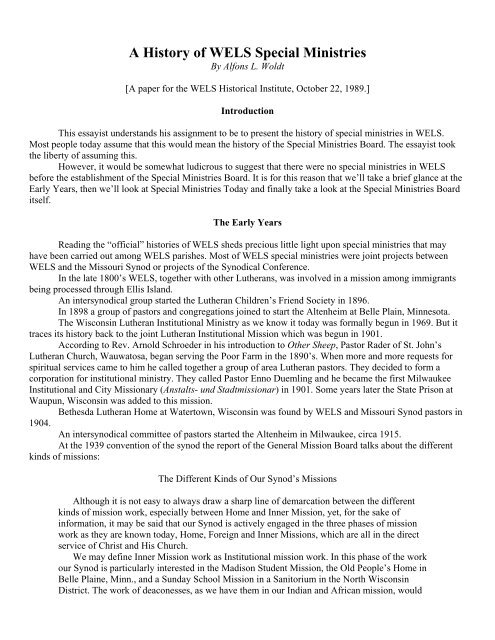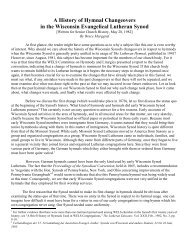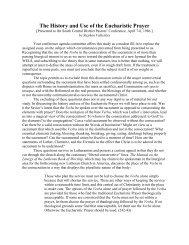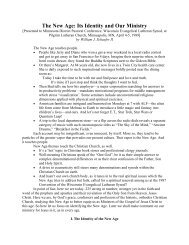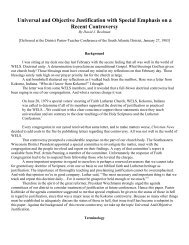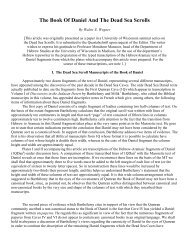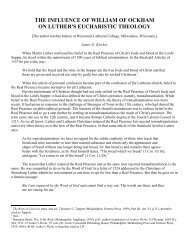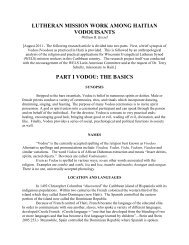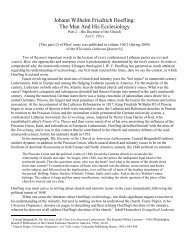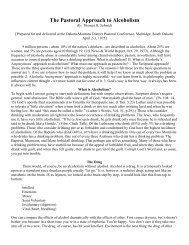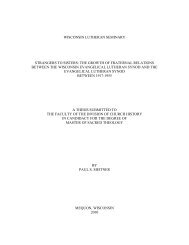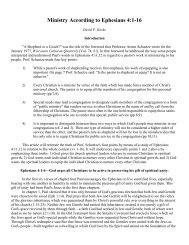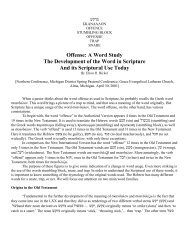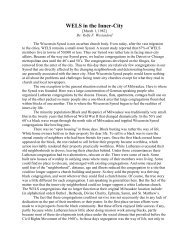A History of WELS Special Ministries - Wisconsin Lutheran Seminary ...
A History of WELS Special Ministries - Wisconsin Lutheran Seminary ...
A History of WELS Special Ministries - Wisconsin Lutheran Seminary ...
Create successful ePaper yourself
Turn your PDF publications into a flip-book with our unique Google optimized e-Paper software.
A <strong>History</strong> <strong>of</strong> <strong>WELS</strong> <strong>Special</strong> <strong>Ministries</strong><br />
By Alfons L. Woldt<br />
[A paper for the <strong>WELS</strong> Historical Institute, October 22, 1989.]<br />
Introduction<br />
This essayist understands his assignment to be to present the history <strong>of</strong> special ministries in <strong>WELS</strong>.<br />
Most people today assume that this would mean the history <strong>of</strong> the <strong>Special</strong> <strong>Ministries</strong> Board. The essayist took<br />
the liberty <strong>of</strong> assuming this.<br />
However, it would be somewhat ludicrous to suggest that there were no special ministries in <strong>WELS</strong><br />
before the establishment <strong>of</strong> the <strong>Special</strong> <strong>Ministries</strong> Board. It is for this reason that we’ll take a brief glance at the<br />
Early Years, then we’ll look at <strong>Special</strong> <strong>Ministries</strong> Today and finally take a look at the <strong>Special</strong> <strong>Ministries</strong> Board<br />
itself.<br />
The Early Years<br />
Reading the “<strong>of</strong>ficial” histories <strong>of</strong> <strong>WELS</strong> sheds precious little light upon special ministries that may<br />
have been carried out among <strong>WELS</strong> parishes. Most <strong>of</strong> <strong>WELS</strong> special ministries were joint projects between<br />
<strong>WELS</strong> and the Missouri Synod or projects <strong>of</strong> the Synodical Conference.<br />
In the late 1800’s <strong>WELS</strong>, together with other <strong>Lutheran</strong>s, was involved in a mission among immigrants<br />
being processed through Ellis Island.<br />
An intersynodical group started the <strong>Lutheran</strong> Children’s Friend Society in 1896.<br />
In 1898 a group <strong>of</strong> pastors and congregations joined to start the Altenheim at Belle Plain, Minnesota.<br />
The <strong>Wisconsin</strong> <strong>Lutheran</strong> Institutional Ministry as we know it today was formally begun in 1969. But it<br />
traces its history back to the joint <strong>Lutheran</strong> Institutional Mission which was begun in 1901.<br />
According to Rev. Arnold Schroeder in his introduction to Other Sheep, Pastor Rader <strong>of</strong> St. John’s<br />
<strong>Lutheran</strong> Church, Wauwatosa, began serving the Poor Farm in the 1890’s. When more and more requests for<br />
spiritual services came to him he called together a group <strong>of</strong> area <strong>Lutheran</strong> pastors. They decided to form a<br />
corporation for institutional ministry. They called Pastor Enno Duemling and he became the first Milwaukee<br />
Institutional and City Missionary (Anstalts- und Stadtmissionar) in 1901. Some years later the State Prison at<br />
Waupun, <strong>Wisconsin</strong> was added to this mission.<br />
Bethesda <strong>Lutheran</strong> Home at Watertown, <strong>Wisconsin</strong> was found by <strong>WELS</strong> and Missouri Synod pastors in<br />
1904.<br />
An intersynodical committee <strong>of</strong> pastors started the Altenheim in Milwaukee, circa 1915.<br />
At the 1939 convention <strong>of</strong> the synod the report <strong>of</strong> the General Mission Board talks about the different<br />
kinds <strong>of</strong> missions:<br />
The Different Kinds <strong>of</strong> Our Synod’s Missions<br />
Although it is not easy to always draw a sharp line <strong>of</strong> demarcation between the different<br />
kinds <strong>of</strong> mission work, especially between Home and Inner Mission, yet, for the sake <strong>of</strong><br />
information, it may be said that our Synod is actively engaged in the three phases <strong>of</strong> mission<br />
work as they are known today, Home, Foreign and Inner Missions, which are all in the direct<br />
service <strong>of</strong> Christ and His Church.<br />
We may define Inner Mission work as Institutional mission work. In this phase <strong>of</strong> the work<br />
our Synod is particularly interested in the Madison Student Mission, the Old People’s Home in<br />
Belle Plaine, Minn., and a Sunday School Mission in a Sanitorium in the North <strong>Wisconsin</strong><br />
District. The work <strong>of</strong> deaconesses, as we have them in our Indian and African mission, would
also come under this heading. Otter missions <strong>of</strong> this nature are conducted in penal institutions,<br />
hospitals, etc., by groups <strong>of</strong> our congregations with like groups <strong>of</strong> other Synodical Conference<br />
churches in our larger cities.<br />
We grant that probably the greater part <strong>of</strong> this Inner or Institutional mission work may be<br />
classified under Home Missions, or that mission work done among those, whether at home—<br />
United States—or abroad—Poland—who are <strong>of</strong> the household <strong>of</strong> faith. In days gone by this<br />
mission was either called Reisepredigermission or Innere Mission, the latter term copied from<br />
the Innere Mission or institutional missions in Germany.<br />
Proceedings, 1939<br />
2<br />
On January 30, 1941, the Spiritual Welfare Commission was established when it was agreed that <strong>WELS</strong><br />
would not support the military chaplaincy program. This will be referred to again in our discussion <strong>of</strong> Military<br />
Services. For your interest Appendices A, B, C and D are added to give you a flavor <strong>of</strong> the thinking that<br />
prevailed at that time.<br />
Many additional ministries were going on but their activity is not documented. In speaking to <strong>WELS</strong><br />
members one can conclude that many congregations developed unique ministries to meet unusual needs.<br />
<strong>Special</strong> <strong>Ministries</strong> Today<br />
<strong>Special</strong> <strong>Ministries</strong> in <strong>WELS</strong> today is still to be found among the congregations <strong>of</strong> <strong>WELS</strong>. In several<br />
areas <strong>of</strong> our synod, congregations have joined together to carry out special ministries. This usually occurs in<br />
areas where a number <strong>of</strong> <strong>WELS</strong> congregations are located in close proximity to one another.<br />
At Watertown, Milwaukee, Oak Creek, Fond du Lac and Waukesha, <strong>Wisconsin</strong> and New Ulm,<br />
Minnesota, congregations have joined to <strong>of</strong>fer special part-time Christian schools for persons who are mentally<br />
retarded.<br />
At Minneapolis and St. Paul, Minnesota, Madison and Milwaukee, <strong>Wisconsin</strong> and in the Northern<br />
<strong>Wisconsin</strong> District and Phoenix, Arizona, special ministries to persons who are institutionalized have been<br />
developed. In addition, approximately 67 <strong>WELS</strong> pastors regularly visit persons who are in prison.<br />
At Phoenix, Arizona, Milwaukee and Fountain City, <strong>Wisconsin</strong>, Belle Plaine, Minnesota and at South<br />
Lyon, Holt, Saginaw and South Haven, Michigan congregations have joined to <strong>of</strong>fer special homes and services<br />
for the aged.<br />
At Milwaukee, <strong>Wisconsin</strong> and at Belle Plaine, Minnesota special housing and programs for persons who<br />
are retarded are <strong>of</strong>fered.<br />
Through the Board for World Missions two medical mission programs are <strong>of</strong>fered at Lusaka, Zambia<br />
and Lilongwe, Malawi. The board also continues to provide a nursery at East Fork, Arizona.<br />
The responsibility for developing, organizing and administering special ministries in <strong>WELS</strong> rests with<br />
the <strong>Special</strong> <strong>Ministries</strong> Board. In terms <strong>of</strong> history, this board is relatively new. Next January the board will be 20<br />
years old.<br />
The <strong>Special</strong> <strong>Ministries</strong> Board as we know it today may trace its history back to several events. The break<br />
up <strong>of</strong> the synodical conference caused the eventual break up <strong>of</strong> joint special ministries projects. The sainted<br />
President Oscar J. Naumann, in his report to the 1963 convention <strong>of</strong> the synod said:<br />
For many years the members <strong>of</strong> our Synod have, individually and collectively, supported<br />
inner mission work as well as home missions and world missions.<br />
I believe our members understand home missions and world missions quite well. Through the<br />
preaching <strong>of</strong> the Gospel in new areas we do home mission work and gather our own members<br />
and newly won converts into congregations and subsidize the administration <strong>of</strong> the means <strong>of</strong><br />
grace in their midst until the congregations become strong enough to become self-supporting. In
world missions we do the same, usually in distant lands among those who had never before heard<br />
the Gospel in all its saving truth.<br />
In inner mission work we are active among those to wham the Savior refers when He says: “I<br />
was an hungered, and ye gave me meat: I was thirsty, and ye gave me drink: I was a stranger,<br />
and ye took me in: naked and ye clothed me: I was sick, and ye visited me: I was in prison, and<br />
ye came unto me” (Matt. 25;35,36). In short, these are Christ’s brethren who because <strong>of</strong> various<br />
circumstances, disaster, sickness, poverty, deafness, blindness, advanced age, imprisonment or<br />
other circumstances cannot care to us or take part in congregational life. We must go to them and<br />
bring the Gospel to them, very <strong>of</strong>ten individually. There can be little thought here <strong>of</strong> building<br />
congregations.<br />
Our members in many areas, especially in metropolitan areas, have seen these people, whom<br />
the Savior in the parable calls “a certain beggar named Lazarus,” lying at their doors. They have<br />
in Christian love organized and supported city mission societies, institutional mission societies,<br />
children’s friend societies, and various other associations supporting this inner mission work.<br />
In some cases congregations and individuals carried on this work through direct financial<br />
support. In other cases a portion <strong>of</strong> the work was done through budgetary allotments requested<br />
and administered as part <strong>of</strong> the responsibility <strong>of</strong> the district board for home missions.<br />
I do not care to call it social welfare work, or even Christian welfare work; I prefer to<br />
recommend that we speak <strong>of</strong> inner mission work in order to emphasize the fact that our prime<br />
purpose is the mission <strong>of</strong> bringing the Gospel to these our brethren and the brethren <strong>of</strong> our<br />
merciful Savior. I prefer to emphasize that this is a mission on which the Savior has sent us and<br />
still sends us.<br />
In the past we have done this in associations formed together with our confessional brethren<br />
and this was pleasing to the Lord our God. Now after we have had to declare with heavy hearts<br />
that the relationship <strong>of</strong> brethren in the visible church has been disturbed by error, we find<br />
ourselves torn between two responsibilities: the God-given mission <strong>of</strong> serving also these<br />
redeemed <strong>of</strong> God, and the equally divine injunction <strong>of</strong> avoiding in spiritual activities those who<br />
support or condone error.<br />
I should like to add to the matters to be considered by the convention the recommendation<br />
that we take steps to establish a board for inner missions. I am told that a conference <strong>of</strong><br />
institutional missionaries will meet during the days <strong>of</strong> this convention. We rejoice over this step<br />
and wish than the Lord’s richest blessings as they confer with one another concerning their work.<br />
3<br />
Proceedings, 1963<br />
The floor committee to whom the matter <strong>of</strong> inner missions was referred presented two resolutions which<br />
were adopted:<br />
Subject: Inner Mission Work (cf. President’s Report)<br />
Whereas, In certain areas <strong>of</strong> the Synod, Inner Mission Work is being done jointly with those with<br />
whom we are no longer in fellowship; therefore be it<br />
Resolved, That an orderly separation <strong>of</strong> this joint work be effected.<br />
Whereas, In other areas <strong>of</strong> the Synod Inner Mission Work is being done through the respective<br />
District Mission Boards; therefore be it<br />
Resolved, a) That the General Board for Home Missions be instructed to initiate and put into<br />
operation a program <strong>of</strong> Inner Mission Work wherever this is feasible, and be it further<br />
Resolved, b) That funds be made available so that this program may be put into operation.<br />
Proceedings, 1963
4<br />
In his report to the 1965 convention President Naumann stated,<br />
The Praesidium <strong>of</strong> the Synod did not as yet appoint a “committee to study the feasibility <strong>of</strong><br />
placing all welfare work <strong>of</strong> the synod under one administrative board.”<br />
Since some <strong>of</strong> these activities fell into the area <strong>of</strong> special ministries, which are closely tied up<br />
with and somewhat under the supervision <strong>of</strong> the General Board for Home Missions, it was feared<br />
that there could be a conflict <strong>of</strong> assignments if these studies were made simultaneously and<br />
possibly without consultation.<br />
A committee on special ministries has been appointed and will give a report.<br />
While some <strong>of</strong> our welfare activities were in the formative stages during the past biennium,<br />
just being established, it was considered somewhat premature to recommend placing all these<br />
phases <strong>of</strong> welfare work under one administrative board.<br />
Now that several new phases <strong>of</strong> welfare work have been established or are definitely being<br />
established, the Synod may still wish to have this study made.”<br />
Proceedings, 1965<br />
The floor committee at this convention also presented a resolution that was adopted:<br />
Subject: Report <strong>of</strong> the Committee on <strong>Special</strong>ized <strong>Ministries</strong>, Reports and Memorials, p. 54<br />
Whereas, The Synod is making a study <strong>of</strong> its mission administration and the relationships<br />
between its various boards and committees, and<br />
Whereas, Floor Committee Number 15 is bringing recommendations regarding this matter;<br />
therefore, be it<br />
Resolved, That action on the Report <strong>of</strong> the Committee on <strong>Special</strong>ized <strong>Ministries</strong> be deferred<br />
perusing the outcome <strong>of</strong> the studies being made.<br />
The 1967 convention did not react specifically to President Naumann’s previous request. However it did<br />
resolve:<br />
Subject: Mission to the Mentally Retard<br />
Whereas, The Board <strong>of</strong> Missions to the Mentally Retarded has been in existence for only a short<br />
time, and<br />
Whereas, They have made a good beginning in their fact-finding studies; therefore, be it<br />
Resolved, a) That they bring pastors, teachers and congregations the needed help and<br />
information for the care and Christian education <strong>of</strong> our mentally retarded, and be it finally<br />
Resolved, b) That in the meantime we continue to support our children at Bethesda <strong>Lutheran</strong><br />
Home at Watertown, <strong>Wisconsin</strong>.<br />
Proceedings, 1967<br />
The 1969 convention adopted two significant resolutions that called for the establishing <strong>of</strong> a program <strong>of</strong><br />
special ministries:<br />
Subject: Department <strong>of</strong> <strong>Special</strong>ized <strong>Ministries</strong><br />
Whereas, The president <strong>of</strong> the Synod, already in his report to the 1963 convention, called<br />
attention to the need for a Department <strong>of</strong> <strong>Special</strong>ized <strong>Ministries</strong>, and<br />
Whereas, The Administration Survey Commission has recommended the creation <strong>of</strong> a<br />
department <strong>of</strong> specialized ministries within the Division <strong>of</strong> Home Missions under the direct
supervision <strong>of</strong> an elected five-man board composed <strong>of</strong> two pastors, two layman, and one<br />
teacher; therefore be it<br />
Resolved, a) That we concur in this recommendation, and be it further<br />
Resolved, b) That the responsibilities <strong>of</strong> the <strong>Lutheran</strong> Spiritual Welfare Commission and the<br />
Board for the Mentally Retarded be transferred to this board, and be it further<br />
Resolved, c) That this board shall also be responsible for counsel and service to the institutional<br />
ministry, social welfare ministries, and other specialized ministries as authorized by the<br />
Synod, and be it further<br />
Resolved, d) That the president <strong>of</strong> the Synod be empowered to make the appointments to this<br />
board for the first biennium and that after the Nominating committee be instructed to<br />
nominate candidates as their appointments expire, and be it finally<br />
Resolved, e) That this matter be referred to the Committee on Constitutional Matters for the<br />
necessary constitutional changes.<br />
5<br />
Subject: Department <strong>of</strong> <strong>Special</strong>ized <strong>Ministries</strong><br />
Whereas, The Administration Survey Commission also recommends that the Board for<br />
specialized ministries be authorized to call a full-time director, and<br />
Whereas, This Department <strong>of</strong> <strong>Special</strong>ized <strong>Ministries</strong> has not yet been organized, nor have the<br />
duties <strong>of</strong> the full-time director been clearly defined; therefore, be it<br />
Resolved, That the Department <strong>of</strong> <strong>Special</strong>ized <strong>Ministries</strong> bring its own recommendation in this<br />
matter to the next Synod convention.<br />
Proceedings, 1969<br />
Following the 1969 convention action the praesidium sent out a letter <strong>of</strong> appointment to five men. The<br />
letter that appears in appendix E was received by the essayist who at the time was a pr<strong>of</strong>essor at <strong>Wisconsin</strong><br />
<strong>Lutheran</strong> College (The teacher training junior college <strong>of</strong> <strong>WELS</strong>). See Appendix E.<br />
Reverend Ernst Lehninger, who was appointed as chairman and who served as chairman for 17 years,<br />
called for an organizational meeting on January 22, 1970. The minutes <strong>of</strong> that first meeting are reproduced in<br />
Appendix F.<br />
It is interesting to read the report from the Administration Survey Commission that was prepared for this<br />
organizational meeting by its chairman, the Reverend James P. Schaefer. See Appendix G.<br />
Thus the <strong>Special</strong>ized <strong>Ministries</strong> Board (note the name) began its work.<br />
The board first <strong>of</strong> all attempted to bring under one administration those committees or commissions that<br />
were engaged in synodical special ministries programs. The board soon realized too that it needed to expand its<br />
ministries to include needs for specialized services that were not being met. As we now attempt to review the<br />
development <strong>of</strong> what we know as the <strong>Special</strong> <strong>Ministries</strong> Board let us be aware <strong>of</strong> how the Lord always provides<br />
for the needs <strong>of</strong> His people.<br />
At its February 27, 1970 meeting the board formally adopted the ministry <strong>of</strong> the Spiritual Welfare<br />
Commission.<br />
The current name, <strong>Special</strong> <strong>Ministries</strong> Board was adopted at the April 24, 1970 meeting.<br />
In 1971 the synod concurred with the SMB’s request to add one pastor and one layman to the board.<br />
At the October 8, 1971 meeting the board resolved to prepare a job description for an executive<br />
secretary.<br />
At the October 25, 1972 meeting it is noted that:<br />
B. Executive Secretary<br />
1. Pastor Berg reports that the coordinating council recommends that the <strong>Special</strong> <strong>Ministries</strong><br />
Board be granted permission to Call an Executive Secretary. This authorization is subject to<br />
the approval <strong>of</strong> the Board <strong>of</strong> Trustees with regard to financing this new project.
2. Qualifications—The Executive Secretary should have had theological training, must possess<br />
administrative skills, and needs to have a genuine concern for people with special needs. The<br />
Chairman and Secretary will compose an appropriate description which can be used for<br />
publication in the Northwestern <strong>Lutheran</strong>.<br />
6<br />
At a November 10th meeting the SMB issued its first Call. This went to the Reverend Arnold Schroeder<br />
to serve as a civilian chaplain in Europe. He declined this Call. The Call subsequently was accepted by the<br />
Reverend Edward Renz who became the first civilian chaplain to be called by the SMB for Europe.<br />
At the March 9, 1973 meeting, the board elected Mr. Alfons Woldt to receive the Call to be executive<br />
secretary to the <strong>Special</strong> <strong>Ministries</strong> Hoard. Mr. Woldt accepted the call, began his work on July 1, 1973 and was<br />
installed into <strong>of</strong>fice on August 14, 1973, during the synod convention at New Ulm, Minnesota.<br />
At this time the sub-committees <strong>of</strong> the <strong>Special</strong> <strong>Ministries</strong> Board consisted <strong>of</strong>: Institutional <strong>Ministries</strong>,<br />
Military Services, <strong>Special</strong> Education, Student Services, Soul Conservation and Mission for the Visually<br />
Handicapped. Several appeals had been received that requested the board to develop a program for those who<br />
are deaf.<br />
On May 3, 1974, the board appointed a standing committee on aging. The study for the need <strong>of</strong> a<br />
program for the deaf continued.<br />
In July 1974, the Soul Conservation program, now called Membership Conservation was turned aver to<br />
the <strong>Special</strong> <strong>Ministries</strong> Board.<br />
The first Conference on Aging, called by the <strong>Special</strong> <strong>Ministries</strong> Board, was held at the synod<br />
administration building April 25, 1975.<br />
In 1975 the synod adopted two significant resolutions:<br />
Subject: Increased Board Membership for the <strong>Special</strong> <strong>Ministries</strong> Board<br />
Whereas, the workload <strong>of</strong> the <strong>Special</strong> <strong>Ministries</strong> Board indicates the need for additional board<br />
members; and<br />
Whereas, it is desirable to have a board member serve as chairman <strong>of</strong> each <strong>Special</strong> <strong>Ministries</strong><br />
Board committee in order to accomplish the work <strong>of</strong> the respective committee more<br />
efficiently; and<br />
Whereas, it would be desirable to have board representation from more than one district;<br />
therefore be it<br />
Resolved, a) That the <strong>Special</strong> <strong>Ministries</strong> Hoard be increased from seven to nine members; and be<br />
it further Resolved, b) That consideration be given to representation from more than one<br />
district; and be it finally<br />
Resolved, c) That the Praesidium appoint one pastor to serve a four year term and one layman to<br />
serve a six year term, thereafter these positions being filled through the normal election<br />
procedures <strong>of</strong> the Synod.<br />
Subject: District <strong>Special</strong> <strong>Ministries</strong> Boards<br />
Whereas, it is difficult for a central board to study adequately the need for specialized ministries<br />
within each district; and<br />
Whereas, it is desirable that impetus for developing specialized ministries programs came also<br />
from within the districts; and<br />
Whereas, the <strong>Special</strong> Education Services Committee wholeheartedly endorses the establishing <strong>of</strong><br />
District <strong>Special</strong> <strong>Ministries</strong> Boards for the purpose <strong>of</strong> identifying and assessing the particular<br />
needs <strong>of</strong> the mentally retarded within the district; therefore be it<br />
Resolved, a) That each district determine the feasibility <strong>of</strong> establishing a District <strong>Special</strong><br />
<strong>Ministries</strong> Board; and be it further
Resolved, b) That the District determine the number <strong>of</strong> men to be elected or appointed to the<br />
District <strong>Special</strong> <strong>Ministries</strong> Board; and be it further<br />
Resolved, c) That the duties and responsibilities <strong>of</strong> the District <strong>Special</strong> <strong>Ministries</strong> Board be<br />
similar to those <strong>of</strong> the <strong>Special</strong> <strong>Ministries</strong> Board; and be it further<br />
Resolved, d) That the District <strong>Special</strong> <strong>Ministries</strong> Board cooperate with the District Mission<br />
Board in all areas <strong>of</strong> special ministries, but especially in the areas <strong>of</strong> campus and institutional<br />
ministries; and be it further<br />
Resolved, e) That the District <strong>Special</strong> <strong>Ministries</strong> Board shall work in harmony with the <strong>Special</strong><br />
<strong>Ministries</strong> Board and submit pertinent reports <strong>of</strong> its activities to the <strong>Special</strong> <strong>Ministries</strong> Board<br />
and be represented at such meetings as called for by the <strong>Special</strong> <strong>Ministries</strong> Board; and be it<br />
finally<br />
Resolved, f) That the District Mission Board appoint one <strong>of</strong> its members to serve as an advisory<br />
member <strong>of</strong> the District <strong>Special</strong> <strong>Ministries</strong> Board.<br />
7<br />
April 8, 1976 marks the first meeting <strong>of</strong> the Mission for the Hearing Impaired. This meeting took place<br />
at the home <strong>of</strong> Mr. William Hughes, Jefferson, <strong>Wisconsin</strong>. Mr. Hughes served as chairman <strong>of</strong> this committee<br />
until December, 1988. He was ably assisted by his wife, Carolyn. When she became seriously ill, Mr. Hughes<br />
reluctantly resigned as chairman <strong>of</strong> the committee and as a member <strong>of</strong> the <strong>Special</strong>. <strong>Ministries</strong> Board.<br />
In September, 1976, an orientation conference for District <strong>Special</strong> <strong>Ministries</strong> Boards was conducted in<br />
Milwaukee. The event is repeated each year in September.<br />
January 12, 1977, the board called the Reverend Clayton Krug as the second civilian chaplain for<br />
Europe. This event marks the beginning <strong>of</strong> a ministry in Europe that made it possible for <strong>WELS</strong> members there<br />
to be served spiritually on a more frequent basis. It enabled our <strong>WELS</strong> pastors and laymen to develop<br />
evangelism programs among Americans in Europe, and more recently, among German nationals.<br />
In 1978, the board purchased a building in St. Paul, Minnesota. This building is the permanent home <strong>of</strong><br />
the Mission for the Visually Handicapped reproduction and distribution center.<br />
In February, 1979, the board released funds to help furnish a group home for persons who are retarded.<br />
This home is located in Milwaukee adjacent to the <strong>Wisconsin</strong> <strong>Lutheran</strong> Child and Family Service.<br />
In July, 1984, the first Organization <strong>of</strong> <strong>WELS</strong> <strong>Lutheran</strong> Seniors was conducted at Martin Luther<br />
Preparatory School, Prairie du Chien, <strong>Wisconsin</strong>.<br />
In May, 1985 the Conference <strong>of</strong> Presidents requested the <strong>Special</strong> <strong>Ministries</strong> Board to appoint a special<br />
committee to study the need for a program that would be concerned that “the quality <strong>of</strong> family life (among<br />
pastors and teachers) be maintained which can cope with the stresses and strains <strong>of</strong> the preaching and teaching<br />
ministry in the society in which we live.”<br />
The 1985 synod convention resolved that, “Congregations <strong>of</strong> <strong>WELS</strong> be encouraged to establish a special<br />
ministries committee using the guidelines <strong>of</strong>fered by the Synod’s <strong>Special</strong> <strong>Ministries</strong> Board in order to help the<br />
special needs <strong>of</strong> its members.”<br />
On January 13, 1986, the <strong>Special</strong> <strong>Ministries</strong> Board joined six other units <strong>of</strong> the synod as they began to<br />
function as the Board for Parish Services.<br />
At the 1987 convention <strong>of</strong> the synod, Reverend Ernst F. Lehninger presented his last report as chairman<br />
<strong>of</strong> the <strong>Special</strong> <strong>Ministries</strong> Board. He was replaced by Dr. Daniel Schmeling.<br />
At the 1989 synod convention the Board for World Missions through its Executive Committee for Japan<br />
requested to call a third chaplain for Europe and a fourth chaplain for Asia. Both men would serve <strong>WELS</strong><br />
members but would also do exploratory work in the area.<br />
<strong>Special</strong> <strong>Ministries</strong> Board<br />
<strong>Special</strong> ministries in <strong>WELS</strong> today is probably synonymous with the activities and programs <strong>of</strong> the<br />
<strong>Special</strong> <strong>Ministries</strong> Board. The continuing purpose <strong>of</strong> the <strong>Special</strong> <strong>Ministries</strong> Board is to assist the <strong>Wisconsin</strong>
Evangelical <strong>Lutheran</strong> Synod and its churches and agencies in meeting the special spiritual needs <strong>of</strong> those who<br />
cannot be served with the Gospel <strong>of</strong> Jesus Christ through the regular programs <strong>of</strong> our churches and schools.<br />
The <strong>Special</strong> <strong>Ministries</strong> Board is made up <strong>of</strong> nine men: three pastors, one elementary teacher, one<br />
secondary teacher and four laymen. Each man is elected by the synod convention for a six-year term. Each<br />
member <strong>of</strong> the board, with the exception <strong>of</strong> the chairman and secretary, serves as the chairman <strong>of</strong> a standing<br />
committee.<br />
The staff consists <strong>of</strong> a called administrator, two pastors who are serving as civilian chaplains and two<br />
<strong>of</strong>fice secretaries.<br />
Most <strong>of</strong> the work <strong>of</strong> special ministries is accomplished through a variety <strong>of</strong> standing committees. What<br />
follows is a brief description <strong>of</strong> each <strong>of</strong> these committees:<br />
Military Services—This is the oldest committee in terms <strong>of</strong> continuous activity. Synod’s work among military<br />
personnel began long before the <strong>Special</strong> <strong>Ministries</strong> Board was established. Even though there was no formal<br />
synodical program pastors in certain areas were called upon to serve as camp or contact pastors. At the turn <strong>of</strong><br />
the century, for example, Pastor Paul Brockman <strong>of</strong> Waukesha, <strong>Wisconsin</strong> served as a camp pastor at Fort<br />
Douglas in Utah.<br />
During World War I there was complete cooperation among the members <strong>of</strong> the Synodical Conference<br />
as they provided spiritual services for members in the military. By mutual agreement <strong>WELS</strong> paid one fifth <strong>of</strong><br />
the cost.<br />
On January 30, 1941 the Spiritual Welfare Commission was formed. Rev. E. R. Blakewell served as<br />
chairman and later as executive secretary during the war years. Congregations were asked to send in names <strong>of</strong><br />
those who were entering military service. A ministry-by-mail program was begun.<br />
At the beginning <strong>of</strong> World War II more than 1000 names were on the file with the SWC. Pastors were<br />
sent to camps here in the U.S. where there was a concentration <strong>of</strong> <strong>WELS</strong> members.<br />
The October 31, 1943 issue <strong>of</strong> The Northwestern <strong>Lutheran</strong> mentioned that fact that there were <strong>WELS</strong><br />
women serving as army and navy nurses and in WACS, WAVES and SPARS.<br />
At the height <strong>of</strong> the war over 17,000 names were in the SWC files.<br />
It was reported that through the cooperation <strong>of</strong> the International Red Cross the SWC was able to send<br />
Christian literature to American prisoners <strong>of</strong> war. See Appendix H for a copy <strong>of</strong> a thank you note received firm<br />
a prisoner <strong>of</strong> war.<br />
Wounded personnel were not neglected. Materials were sent to hospitals and veteran facilities. The files<br />
listed over 1,100 who were either sick or wounded.<br />
The summer <strong>of</strong> 1945 statistics showed that according to SWC records 364 <strong>WELS</strong> members were killed<br />
during World War II, 151 were missing in action, 62 were prisoners <strong>of</strong> war in Germany and eight were<br />
imprisoned by the Japanese. The total number <strong>of</strong> names processed by the SWC during World War II numbered<br />
22,205.<br />
After World War II the SWC continued to serve the wounded and others who were away from their<br />
spiritual homes. Obviously the number <strong>of</strong> names on file reduced drastically.<br />
During the Korean conflict the activity <strong>of</strong> the SWC increased again. As <strong>of</strong> January 1, 1951<br />
approximately 2000 names were on file. A full time pastor, Luther Voss, was called to serve Camp Rucker,<br />
Alabama. At that time 200 <strong>WELS</strong> men were stationed there. By December, 4000 service personnel were on the<br />
SWC list.<br />
The SWC’s contact with service personnel remained constant. In 1952, Pastor Fred Tiefel was called to<br />
serve military personnel in the Japan-Korea area.<br />
In 1962, the SWC divided itself into two committees: The Military Services Committee and the Student<br />
Services Committee.<br />
In December, 1965, Pastor Luther Voss was called to serve as a civilian chaplain in Vietnam.<br />
In 1970 the <strong>Special</strong> <strong>Ministries</strong> Hoard assumed the work <strong>of</strong> the Spiritual Welfare Commission. One <strong>of</strong> its<br />
first acts was to call the Reverend Edward Renz to serve as the first <strong>WELS</strong> civilian chaplain for Europe. Pastor<br />
8
Benz served for nine years. After his return he compiled A <strong>History</strong> <strong>of</strong> Spiritual Services for Military Personnel.<br />
Most <strong>of</strong> the information cited above was taken from his work.<br />
The Military Services Committee today, chaired by Mr. Richard Raabe, supervises two full-time<br />
chaplains in Europe and 120 part-time civilian chaplains in the U.S., Asia and South America.<br />
It sends out printed worship services each month. In addition worship services on cassette and video<br />
tape, The Northwestern <strong>Lutheran</strong> and Meditations are sent to military personnel and civilians overseas.<br />
Approximately 5000 people are served today.<br />
Student Services—Student services is an <strong>of</strong>fice function <strong>of</strong> the <strong>Special</strong> <strong>Ministries</strong> Board. As student names are<br />
received by the SMB <strong>of</strong>fice they are forwarded to the nearest campus ministry or congregation. Campus<br />
ministry is administered by the Board for Home Missions.<br />
Mission for the Visually Handicapped—In 1965, President Oscar Naumann approached the <strong>Lutheran</strong><br />
Women’s Missionary Society and asked them to develop a program <strong>of</strong> service for people who are blind. This<br />
they were glad to do. In 1970, this work also came under the umbrella <strong>of</strong> the <strong>Special</strong> <strong>Ministries</strong> Hoard. Credit<br />
must be given to the <strong>Lutheran</strong> Women’s Missionary Society for laying the foundation <strong>of</strong> a program that has few<br />
peers among denominations as they attempt to minister to members who are blind. Their leader for the<br />
development was Mrs. Erna Speckin. Credit must also given to Mr. Clarence Saatkamp who served as chairman<br />
<strong>of</strong> this committee for 18 years. Under his able leadership the cassette program was added, the program was<br />
made available to anyone, including non-<strong>WELS</strong>, who for whatever reason are unable to read. The workshop<br />
building was purchased in St. Paul and the number <strong>of</strong> people served expanded.<br />
Today the program continues as it <strong>of</strong>fers spiritual materials in braille, large print and on cassette tape.<br />
Any publications <strong>of</strong> the Northwestern Publishing House are reproduced. Synodical school concerts, sermons<br />
and worship services are also available on cassette.<br />
<strong>Special</strong> Education Services—In 1966, the Praesidium appointed a Board for Our Mission to the Mentally<br />
Retarded. Under the chairmanship <strong>of</strong> Pastor Frederick Kosanke, this board studied the problem <strong>of</strong> how best to<br />
minister to <strong>WELS</strong> members at Bethesda <strong>Lutheran</strong> Home <strong>of</strong> Watertown, <strong>Wisconsin</strong>. The board also did some<br />
preliminary work in the area <strong>of</strong> how best to serve persons in <strong>WELS</strong> who are mentally retarded. Their work was<br />
turned over to the <strong>Special</strong> <strong>Ministries</strong> Board in 1970.<br />
Currently the <strong>Special</strong> Education Services Committee is under the leadership <strong>of</strong> Mr. Bruce Cuppan. The<br />
committee has developed a simplified catechism and Bible stories book together with an appropriate teacher’s<br />
guide. It developed the He Cares-We Care special mailing program in two age levels for persons who are<br />
retarded. Jesus Cares Schools <strong>of</strong>fer part-time Christian training in six strategic locations. A pen-pal program is<br />
available. The committee continues to plan for producing additional materials at a variety <strong>of</strong> levels <strong>of</strong> difficulty.<br />
Workshops for teachers as well as consultation services are <strong>of</strong>fered.<br />
Institutional <strong>Ministries</strong>—This committee is under the chairmanship <strong>of</strong> Rev. Edgar Herman <strong>of</strong> Flat Rock,<br />
Michigan. All committee members live in Michigan. The committee encourages lay ministry among persons<br />
living in institutions, pastors to conduct services in nursing times, health facilities and prisons and produces<br />
materials to support these ministries.<br />
A special ministry-by-mail program provides spiritual materials for persons who are incarcerated.<br />
Services to the Aging—Today the committee is under the chairmanship <strong>of</strong> Reverend Keith Kruck. This<br />
committee has developed a number <strong>of</strong> programs over the years. It first directed its attention towards older<br />
persons who are disabled. It prepared guidelines and materials to encourage congregations to be aware <strong>of</strong> the<br />
needs <strong>of</strong> the disabled elderly.<br />
During the time when Reverend Robert Schlict was chairman, the committee directed its attention to the<br />
able elderly. Since this group represents 97% <strong>of</strong> the elderly it was felt that a program needed to be developed<br />
9
for them. One <strong>of</strong> the obvious examples <strong>of</strong> this effort was the establishing <strong>of</strong> the Organization <strong>of</strong> <strong>WELS</strong><br />
<strong>Lutheran</strong> Seniors in July, 1984.<br />
Today the committee continues to produce special materials. It is currently working on a manual for the<br />
parishes <strong>of</strong> WEIS which will suggest a ministry among the rapidly growing number <strong>of</strong> aging in <strong>WELS</strong>.<br />
Membership Conservation—Membership Conservation, formerly called Soul Conservation, is now an <strong>of</strong>fice<br />
function <strong>of</strong> the SMB. It was begun as a program by Pastor Valleskey in Michigan and turned over to the SMB<br />
in 1974.<br />
This program assists 700 <strong>WELS</strong> individuals or families who move to locate one <strong>of</strong> our <strong>WELS</strong> affiliated<br />
churches. If no church is to be found in the area, these members <strong>of</strong> <strong>WELS</strong> are referred to the appropriate district<br />
mission board that is responsible for the area. They then are also placed on a ministry-by-mail program.<br />
Mission for the Hearing Impaired—Under the leadership <strong>of</strong> the current chairman, Mr. Gene Seidel, the<br />
committee is reorganizing following the resignation <strong>of</strong> Mr. William Hughes. During the 11 years that Mr.<br />
Hughes was chairman the committee began to compile the names <strong>of</strong> persons in <strong>WELS</strong> who are deaf. It <strong>of</strong>fered<br />
convocations for persons who are deaf and their families. A guidelines booklet for parishes called Ephphtha<br />
was distributed. A signed Bible story was prepared. Signed worship services are encouraged (we know <strong>of</strong> 12<br />
in <strong>WELS</strong> and many are needed). A newsletter is sent out quarterly. It encourages adequate sound systems for<br />
churches. It <strong>of</strong>fers financial assistance to persons who wish to study sign language.<br />
The committee is concerned about developing an outreach program among persons who are deaf.<br />
Knowing that 85% <strong>of</strong> the 15 million persons in the U.S. who are deaf have no church affiliation presents a real<br />
mission potential. The committee is also aware that handicapped persons, especially those who are hearing<br />
impaired, tend to develop strong peer relationships. The committee intends to encourage our brothers and sisters<br />
in Christ to invite their friends. But to do so, we need more signed services and special programs.<br />
The committee realizes that it must continue to strive against a common misconception. It is natural for<br />
people to say, “Why do we need a program for the deaf? They can read! Can’t they?” This demonstrates that<br />
most people simply do not understand the difficulty <strong>of</strong> being hearing impaired.<br />
Care Committee for Called Workers—Under the leadership <strong>of</strong> Rev. Kenneth Lenz this committee attempts to<br />
develop programs <strong>of</strong> service for pastors and teachers and their families who are experiencing personal<br />
problems.<br />
It has developed in-service workshops and retreats for called workers and spouses. A printed resource<br />
center gathers material and makes them available to pastors and teachers. It has designed a plan for establishing<br />
a parish Care Committee for Called Workers. An 800 telephone crisis intervention number has been made<br />
available for called workers and dependents. Providers <strong>of</strong> counseling services have been identified in each<br />
district.<br />
More recently the committee developed a system <strong>of</strong> exit interviews to be used under the direction <strong>of</strong> the<br />
district president when a called worker resigns.<br />
Conclusion<br />
<strong>Special</strong> ministries in <strong>WELS</strong> today developed over a comparatively short period <strong>of</strong> time. Credit must be<br />
given to many congregations and associations <strong>of</strong> congregations who addressed the needs <strong>of</strong> “God’s special<br />
people” for many years. Their work, and much <strong>of</strong> this is still going on today, needs to be continued because a<br />
central synodical board can only plan and suggest.<br />
The <strong>Special</strong> <strong>Ministries</strong> Board sincerely requests <strong>of</strong> all <strong>of</strong> you that you support its work with your<br />
prayers. Then we together can indeed, “Carry each other’s burdens, and in this way you will fulfill the law <strong>of</strong><br />
Christ,” Gal. 6:2.<br />
10
Selected References<br />
11<br />
Board for Parish Education. You and Your Synod. Milwaukee, WI: Northwestern Publishing House, 1972.<br />
Centennial Committee. Continuing in His Word (A <strong>History</strong> <strong>of</strong> <strong>WELS</strong> 1850-1950), Milwaukee, WI:<br />
Northwestern Publishing House, 1951.<br />
Koehler, John Philipp. The <strong>History</strong> <strong>of</strong> the <strong>Wisconsin</strong> Synod, Faith-Life, The Protestant Conference, 2nd ed.<br />
Saulk Rapids, MN: Sentinel Printing Co., 1981.<br />
Minutes, The <strong>Special</strong> <strong>Ministries</strong> Hoard, 1970-1989.<br />
Proceedings, <strong>Wisconsin</strong> Evangelical <strong>Lutheran</strong> Synod, 1935, 1939, 1941, 1963, 1987.<br />
Renz, Edward C. A <strong>History</strong> <strong>of</strong> Spiritual Services for Military Personnel. Available from the <strong>Special</strong> <strong>Ministries</strong><br />
Board, 2929 N. Mayfair Rd., Milwaukee, WI 53222, 1982.<br />
Schroeder, Arnold H. Other Sheep. Milwaukee, WI: Northwestern Publishing House, 1981.
Appendix A<br />
12<br />
Report <strong>of</strong> the Committee on Chaplaincies<br />
To the Honorable Joint Synod <strong>of</strong> <strong>Wisconsin</strong>, Michigan, Minnesota and Other States, N.W.C., Watertown,<br />
<strong>Wisconsin</strong>.<br />
Brethen:<br />
Your committee on Army and Navy chaplaincies after a thorough study <strong>of</strong> all the available information<br />
and literature is <strong>of</strong> the unanimous opinion that we do not commission pastors to function in this capacity<br />
according to governmental regulations, because:<br />
1. Since any ordained pastor is at liberty to minister unto the men in service, we deem it not<br />
necessary, in obedience to the command, “Go ye, therefore, and teach all nations, etc.,” to call<br />
men as commissioned Army and Navy chaplains; and<br />
2. We believe that to appoint or call ordained pastors as commissioned chaplains in accordance<br />
with the rules and regulations <strong>of</strong> the government, which includes remuneration by the<br />
government for their services, as well as the final choice by the government <strong>of</strong> the man so<br />
commissioned, is not in harmony with Scripture, because the fundamental principle <strong>of</strong> the<br />
separation <strong>of</strong> Church and state is thereby violated; and<br />
3. Although we have been most definitely assured by such who have been, and are now, in the<br />
service that it is possible for such commissioned chaplain to practice sound doctrine and<br />
confessional <strong>Lutheran</strong>ism, we fear after a thorough study <strong>of</strong> AR 605-30, TM 2270-5 and AR<br />
60-5 that it will become a practical impossibility for them when once in the service.<br />
As to the advisability <strong>of</strong> calling and supporting our own chaplains your committee is not competent to<br />
make definite proposals, since only a comprehensive survey <strong>of</strong> Army camps and Navy zones can determine the<br />
necessity <strong>of</strong> such action, and therefore it recommends that the respective Mission Boards make such surveys in<br />
the event that the above recommendations are adopted.<br />
Respectfully submitted,<br />
A1. Maas, Chairman<br />
O. J. R. Hoerecke.<br />
A. Wacker.<br />
F. Soll.<br />
Per G.L. Press, Secretary.<br />
Adopted Proceedings, 1939<br />
Appendix B<br />
Spiritual Welfare Commission<br />
Since to date we have not been able to establish a cooperative agreement with the Army and Navy Board<br />
<strong>of</strong> the Honorable Missouri Synod, because <strong>of</strong> differences regarding various policies and principles, such as the<br />
calling and commissioning <strong>of</strong> chaplains on the part <strong>of</strong> the church, collaboration in externals with groups outside<br />
<strong>of</strong> the Synodical Conference, and since the S.W.C. is not functioning as an independent unit but merely as a<br />
subcommittee <strong>of</strong> the General Mission Board, we therefore recommend that, for the time being, the S.W.C.<br />
continue to operate to the best <strong>of</strong> its ability in providing spiritual care for our men in service,
13<br />
1. By continuous communication<br />
a) through their local pastor and congregation;<br />
b) through the <strong>of</strong>fice <strong>of</strong> the Executive Secretary.<br />
2. By sending pastors, where feasible, to camps and bases where larger groups <strong>of</strong> men from our<br />
circles are stationed, e.g., Alexandria, La., San Diego, Cal., San Francisco, Cal., etc.<br />
3. By directing our men to pastors where this is possible. In order to do this it is absolutely<br />
necessary that the names <strong>of</strong> all men in service be forwarded to the <strong>of</strong>fice <strong>of</strong> the Executive<br />
Secretary.<br />
In order that the recommendations adopted by the General Committee become effective, we herewith<br />
submit the following suggestions to the General Mission Board,<br />
1. That a full time paid Executive Secretary be appointed as soon as necessary;<br />
2. That the Mission Board authorize the calling <strong>of</strong> men as civilian pastors in communities where<br />
the S.W.C. finds it necessary, and<br />
3. That after consultation with the District Presidents a list <strong>of</strong> available candidates for these<br />
positions be submitted to the S.W.C. and that the Mission Board authorize the S.W.C. to issue<br />
a call making its selection from established list submitted.<br />
Resolutions pertaining to the Spiritual Welfare Commission:<br />
1. That we express our joy that according to a communication <strong>of</strong> August 5, 1941, from the Amy<br />
and Navy Commission, “IV. The Army and Navy Commission is prepared and willing to<br />
continue negotiations with the Spiritual Welfare Commission <strong>of</strong> the <strong>Wisconsin</strong> Synod or other<br />
representatives <strong>of</strong> that body in order to effect a program <strong>of</strong> coordinated effort between the two<br />
commissions.”<br />
2. That, since according to the resolution <strong>of</strong> the Synod we cannot cooperate in the calling <strong>of</strong><br />
chaplains and, since we cannot cooperate with the <strong>Lutheran</strong> Social Centers, we instruct the<br />
Spiritual Welfare Commission to continue negotiating with the Army and Navy Commission<br />
and seek cooperation at least in the exchange <strong>of</strong> the lists <strong>of</strong> pastors near the army camps to<br />
which they and we can direct the men in service.<br />
3. That we adopt the recommendation <strong>of</strong> the Spiritual Welfare Commission “to continue to<br />
operate to the best <strong>of</strong> its ability in providing spiritual care for our men in service,” as outlined<br />
in Points 1 (a,b), 2 and 3 in the First Paragraph <strong>of</strong> the Commission’s Report.<br />
4. That we adopt the recommendations by the Spiritual Welfare Commission to the General<br />
Mission Board, as outlined in Points 1, 2 and 3 in the Second Paragraph <strong>of</strong> the Commission’s<br />
Report, with the provision that Point 1 be changed to read: That it be left to the discretion <strong>of</strong><br />
the General Mission Board to appoint a full-time Executive Secretary for a given period,<br />
preferably a pastor who can obtain a leave <strong>of</strong> absence from his congregation, and that only as<br />
soon as it becomes definitely necessary, a full-time, paid Executive Secretary be called by the<br />
General Mission Board.<br />
5. That the Synod take favorable action in providing sufficient funds for this work and include<br />
the proposed $25,000.00 for the Spiritual Welfare Commission in its budget.<br />
6. That our congregations be urged to increase their contributions for missions in order to meet<br />
these additional obligations.<br />
7. That the Spiritual Welfare Commission make special mission envelopes available to those<br />
congregations who desire to use than.<br />
Proceedings, 1941
Appendix C<br />
14<br />
Report <strong>of</strong> the Committee on Chaplaincies<br />
To the Honorable Joint Synod <strong>of</strong> <strong>Wisconsin</strong> and Other States, Saginaw, Michigan.<br />
Dear Brethren:<br />
After a restudy <strong>of</strong> the “Report <strong>of</strong> the Committee on Chaplaincies,” which was adopted by the Synod in<br />
1939 (see Report, pages 67-67), and after a study <strong>of</strong> the information made available to us by the Spiritual<br />
Welfare Commission, including the Training Manual (TM 2270-5, 1-131) and Amy Regulations (AR 60-5, 1-2;<br />
AR 104-25, 1-2) for Chaplains, issued by the War Department, your committee respectfully submits the<br />
following opinion:<br />
The commissioning <strong>of</strong> Army and Navy chaplains by our Synod would conflict with<br />
Scriptural principles and established <strong>Lutheran</strong> practice, because<br />
1. The application for and the appointment to chaplaincy conflicts with our doctrinal<br />
stand on the divinity <strong>of</strong> the pastoral call. Also, the Training Manual <strong>of</strong> the War<br />
Department entitled “The Chaplain” specifies duties to the chaplain which are in direct<br />
violation <strong>of</strong> the divine call <strong>of</strong> a <strong>Lutheran</strong> pastor.<br />
2. The appointment to chaplaincy and the regulation <strong>of</strong> the chaplains’ duties by the War<br />
Department are a violation <strong>of</strong> the principle <strong>of</strong> separation <strong>of</strong> Church and State.<br />
3. The spirit <strong>of</strong> doctrinal indifferentism pervades the regulations <strong>of</strong> the War Department<br />
pertaining to the <strong>of</strong>fice <strong>of</strong> chaplaincy and fosters unionism.<br />
E.J. Berg, Chairman<br />
G.W. Fischer, Secretary.<br />
Proceedings, 1941<br />
Appendix D<br />
The Chaplaincy<br />
I. What are the terms under which men are bound by their oath when they serve as Arm Chaplains?<br />
II. Is it possible for us to meet these terms without violating Scriptural injunction and <strong>Lutheran</strong> practice?<br />
I.<br />
1. (Quotations are from War Department Technical Manual 16-205, June, 1947 (TM) and from Army<br />
Regulations No. 60-5, December, 1946 (AR). Each quotation is lettered for convenient reference hereinafter.)<br />
(A) “His church, denomination or similar religious group will be the recommending agency for an ordained<br />
minister seeking an initial appointment in the Army <strong>of</strong> the United States.” TM, p. 12.<br />
(B) “Only through the agency <strong>of</strong> the civilian church is the clergyman made available to the Army as a<br />
chaplain.” TM, p. 25.<br />
(C) “The chaplain’s task is to serve the moral, religious and spiritual needs <strong>of</strong> the individuals <strong>of</strong> the command to<br />
which he is assigned.” TM, p. 1.
(D) “The chaplain will observe the rules and regulations <strong>of</strong> his denomination unless the rules have been<br />
modified by the denomination upon his commission as a chaplain in the armed forces.” TM, p. 26.<br />
(E) “The authority <strong>of</strong> an administrative or supervisory chaplain applies only to the military relationship. Within<br />
the ecclesiastical sphere, the chaplain is governed by the law <strong>of</strong> his church. common sense, and charitable<br />
regard for others.” TM, p. 3.<br />
(F) “It is the duty <strong>of</strong> the commanding <strong>of</strong>ficer to exercise active supervision over the military activities <strong>of</strong> the<br />
chaplains under their command without trespassing upon the ecclesiastical field.” AR, p. 4.<br />
(G) “Chaplains are required by law to conduct appropriate religious services for the military installations and<br />
organizations to which they are assigned.” TM, p. 21.<br />
(H) “The duties <strong>of</strong> chaplains as prescribed by existing laws are closely analogous to those performed by<br />
clergymen in civilian life, modified only by the peculiar conditions attaching to military life and especially<br />
by the necessity that each chaplain will, so far as practicable, serve the moral and religious needs <strong>of</strong> the<br />
entire personnel <strong>of</strong> the command to which he is assigned, either through his own personal services or<br />
through the cooperative efforts <strong>of</strong> others. The chaplain will be reminded that until the religious service<br />
needs <strong>of</strong> Roman Catholic, Protestant and Jewish personnel <strong>of</strong> his unit or command have been met, he has<br />
not fulfilled the moral obligation <strong>of</strong> the law.” TM, p. 22.<br />
(I) “Preaching Missions, Novenas and Holy Days Obligation. <strong>Special</strong> services <strong>of</strong> this type, Lent, National<br />
Mission Week, the National Week <strong>of</strong> Prayer, etc., are conducted by all churches during the calendar year.<br />
These are held to be a part <strong>of</strong> the chaplain’s religious program.” TM, p. 22.<br />
(J) “It is to be remembered by all chaplains that the special Holy Days <strong>of</strong> both Christian and Jewish personnel<br />
are <strong>of</strong> great spiritual importance and are not to be overlooked, no matter how small the minority <strong>of</strong> the<br />
command involved.” TM, p. 22.<br />
(K) “Care will be exercised by the chaplain…not to inflict the religious services upon any man <strong>of</strong> another<br />
faith.” TM, p. 23.<br />
(L) “(b) Denominational Limitations. If the individual chaplain is incapable <strong>of</strong> holding appropriate services for<br />
the entire command by reason <strong>of</strong> denominational limitations, he will be personally responsible for obtaining<br />
the services <strong>of</strong> other chaplains, qualified <strong>of</strong>ficers or enlisted men, or civilian clergymen, to meet the needs.<br />
A cursory search for such assistance is not sufficient when the spiritual lives <strong>of</strong> military personnel are<br />
involved. No effort on the part <strong>of</strong> the chaplain shall be spared to see that Mass is provided for Roman<br />
Catholic men, Protestant services are held for Protestants, and Jewish services held for Jewish personnel.”<br />
TM, p. 23.<br />
(M) “Chaplains will conduct or arrange appropriate burial services at the interment <strong>of</strong> members <strong>of</strong> the military<br />
service, active and retired, and for members <strong>of</strong> their families, when requested. They may perform marriages<br />
upon proper legal authorization in each case, administer Christian baptism, and perform other religious rites<br />
for the military personnel and civilians residing upon or employed in the military reservation, according to<br />
their respective creeds or conscientious practice.” TM, p. 23.<br />
(N) “Chaplains will conduct or arrange appropriate burial services at the interment <strong>of</strong> members <strong>of</strong> the military<br />
service, active and retired, and for members <strong>of</strong> their families upon request…Chaplains will administer or be<br />
accountable for rites and sacraments for military personnel and civilians under military jurisdiction according<br />
to the respective creeds and conscientious practices <strong>of</strong> all concerned.” AR, p. 3.<br />
(O) “(c) Denominational Limitations. Care will be exercised by all concerned, in asking for these religious rites,<br />
that the chaplain is not required to violate his church laws in these matters. Pr<strong>of</strong>essional integrity among<br />
chaplains will preclude any criticism <strong>of</strong> one another because <strong>of</strong> certain church laws or personal matters <strong>of</strong><br />
conscience in these cases. A memorial ceremony for deceased personnel <strong>of</strong> the command as outlined in<br />
paragraph 64b may solve the problem <strong>of</strong> denominational conflict which will sometimes arise concerning a<br />
funeral which is a religious rite. A memorial ceremony should not be substituted for or preclude the proper<br />
religious rite if one is desired by the bereaved.” TM, p. 23.<br />
(P) “Pastoral calling should never be neglected…the chaplain should make visits <strong>of</strong> a pastoral nature to the<br />
families <strong>of</strong> all military personnel who reside within or near the military reservation.” TM, p. 24.<br />
15
(Q) “In addition to his Church School, the chaplain should arrange for instruction in catechism if it is desired by<br />
the military personnel or their dependents in preparation for church membership or confirmation. If the<br />
chaplain is not qualified because <strong>of</strong> denominational affiliation to meet the need personally, he should render<br />
whatever assistance is needed in making the proper denominational contacts.” TM, p. 25.<br />
(R) “Ceremonies—Patriotic and Memorial. These ceremonies may be described as occasions which all<br />
chaplains and military personnel <strong>of</strong> the three major faiths may attend…Suggested outline for ceremonies:<br />
Invocation and benediction (Protestant, Catholic, or Jewish, or all three); Patriotic music…etc.”<br />
2. In defining the duties <strong>of</strong> a chaplain as being “closely analogous” (H) to those <strong>of</strong> a civilian clergyman, the<br />
Manual compels us to reappraise the assumption, hitherto regarded by many as self-evident, that the<br />
chaplaincy is an <strong>of</strong>fice identical in nature with that <strong>of</strong> the Pastoral Office in the Church.<br />
The following factors are here to be considered: Although the Church is not denied the right <strong>of</strong><br />
extending to its candidates a call into the Chaplaincy, the Call is not regarded by the government as a<br />
necessary feature <strong>of</strong> the <strong>of</strong>fice. The appointment is conferred by the secular powers <strong>of</strong> the Army. (A) (B).<br />
The chaplain is not called by the individuals or group to which he is assigned.<br />
(C) He is a military <strong>of</strong>ficer, being subject to military regulations imposed upon him and his command.<br />
Indeed, in a given unit it is not the chaplain, but the commanding <strong>of</strong>ficer who “is responsible for the spiritual<br />
welfare and religious program <strong>of</strong> the unit.” (TM, p. 18.) (It is difficult to reconcile this latter provision with<br />
that in quotation (F).<br />
The strenuous efforts <strong>of</strong> the military in protecting the consciences and convictions <strong>of</strong> the individual<br />
chaplain are commendable, noteworthy and, in view <strong>of</strong> the normal rigidity <strong>of</strong> military regulations, remarkable.<br />
We acknowledge this despite the fact that such efforts have not, in our view, attained the success which is<br />
claimed for them.<br />
In his spiritual ministrations, the chaplain is utterly free from the control <strong>of</strong> military superiors, whether<br />
they be supervisory chaplains or commanding <strong>of</strong>ficers. (F) (E).<br />
It is specifically and repeatedly stipulated that no chaplain shall be held personally to perform a religious<br />
service the circumstances <strong>of</strong> which militate against his convictions or the regulations <strong>of</strong> his Church. (L) (O) (D).<br />
Despite the fact that the chaplain is held personally responsible for the supplying <strong>of</strong> the spiritual needs<br />
<strong>of</strong> the entire personnel under his command, regardless <strong>of</strong> their several affiliations, he need only provide<br />
acceptable ministration in cases where he himself may not <strong>of</strong>ficiate. (L) (Q).<br />
II.<br />
1. Is it possible for us to meet the terms imposed by the regulations governing the Chaplaincy without violating<br />
Scriptural injunction and <strong>Lutheran</strong> practice?<br />
When we review the several duties and assignments imposed upon the Chaplaincy, we find that they<br />
include every form <strong>of</strong> service which a minister <strong>of</strong> the Word can render, and place the chaplain into a position<br />
<strong>of</strong> oath-bound responsibility toward these services (H); yet in all <strong>of</strong> this the government is not bound by<br />
Scriptural principles (D) (H). The chaplaincy is a ministry <strong>of</strong> expediency. The chaplain’s parish is not<br />
limited. He serves an undefined group, which may well include parishioners in the charge <strong>of</strong> duly called<br />
shepherds, and may thus become a busy-body in other men’s matters. The conclusion is inescapable that in<br />
the Chaplaincy the government has instituted a form <strong>of</strong> ministry <strong>of</strong> the Word which is thoroughly corrupted<br />
by human and sinful stipulations.<br />
2. Equally weighty and determinative is the fact that a large degree <strong>of</strong> uncertainty remains in the area within<br />
which a chaplain must correlate the dictates <strong>of</strong> conscience with the unqualified demands made upon him as a<br />
spiritual <strong>of</strong>ficer. He is told that, in addition to “the laws <strong>of</strong> his church,” he is to be governed by “common<br />
sense and charitable regard for others! (E) Experience and a knowledge <strong>of</strong> the interpretation nationally<br />
16
placed upon the concepts <strong>of</strong> common sense in religious matters and charitable regard for others warn us that<br />
a strictly Biblical exercise <strong>of</strong> either virtue does not commend itself to the latitudinarian religious ideals<br />
popular today and practiced in government as well as in many areas <strong>of</strong> American life dominated by the spirit<br />
<strong>of</strong> unionism and lodgery. We have an indication <strong>of</strong> this in the Manual, where a plan is presented for<br />
ceremonies which are allegedly adapted to the conscientious reservations <strong>of</strong> all religious persuasions. Such<br />
ceremonies, which “all chaplains and military personnel <strong>of</strong> the three major faiths may attend,” are to include<br />
Invocation and Benediction, Protestant, Catholic, Jewish, or all three. (R).<br />
The government’s expressed attitude toward cooperation in religious practices hardly conforms to the<br />
standard <strong>of</strong> confessionalism required by Romans 16, 17, 18 and other Scripture. To work conscientiously and<br />
without deviation from divine directives in such an environment might well be regarded by one who is under<br />
obedience to Christ as an ambition beyond the reasonable hope <strong>of</strong> attainment.<br />
Despite the protective provisions designed to meet the scruples <strong>of</strong> the individual chaplains and guard the<br />
inviolability <strong>of</strong> his conscience, the conflict between the absoluteness <strong>of</strong> his personal responsibility (G) (J) (I)<br />
(H) and the safeguards erected for his private convictions places the nature <strong>of</strong> its ultimate resolution in doubt,<br />
particularly if and when the chaplain is assigned to a combat theater and lacks those facilities which may<br />
make several alternatives <strong>of</strong> action (L) possible in more settled areas. We call attention to a statement in a<br />
report by Harold Lavine, war correspondent <strong>of</strong> Newsweek, sent from Korea and published in the issue <strong>of</strong><br />
October 30, 1950: “Since there is a Defense Department policy that no American serviceman shall go<br />
without spiritual guidance, chaplains <strong>of</strong>ten must conduct services not <strong>of</strong> their own faith.”<br />
In any event, a chaplain is categorically responsible for the spiritual care <strong>of</strong> the members <strong>of</strong> every<br />
religious persuasion in his command. (C) (J) (H) (M) (N) (P) (Q). Though restrained by personal inhibitions<br />
from performing certain ministerial acts, he must see that they are performed. He must, in the eyes <strong>of</strong> his<br />
command and <strong>of</strong> the world, recognize as <strong>of</strong> equal value the importance, merits and efficacy <strong>of</strong> Scriptural,<br />
Catholic and Jewish rites. He must be ready actively to implement the performance <strong>of</strong> extreme unction, the<br />
mass, circumcision, lodge burial and the like, lending to such acts his personal, sober approval. To meet this<br />
obligation without hypocrisy and implicit denial <strong>of</strong> the Truth would seem an impossible achievement. Such<br />
cooperation in spiritual matters with the powers <strong>of</strong> Antichrist and Judaism would be regarded as a violation<br />
<strong>of</strong> his <strong>of</strong>fice by any truly <strong>Lutheran</strong> pastor in civilian life, and can hardly be justified under any conditions,<br />
normal or abnormal.<br />
It would seem, therefore, that despite the not inconsiderable efforts <strong>of</strong> the military to establish a form <strong>of</strong><br />
chaplaincy palatable to the most exacting conscience, its good intentions have failed to achieve a degree <strong>of</strong><br />
conformity with correct Christian principles which might relieve us <strong>of</strong> the necessity <strong>of</strong> rejecting the<br />
chaplaincy as an instrument <strong>of</strong> service to our brethren in the Armed Forces.<br />
3. In view <strong>of</strong> the provision (TM. p. 36) <strong>of</strong> the Manual making military chapels available for the use <strong>of</strong><br />
denominational groups not represented by a chaplain. and with the desire to make positive proposals in<br />
behalf <strong>of</strong> the spiritual needs <strong>of</strong> our service men. your committee begs leave to recommend:<br />
a. That the <strong>Lutheran</strong> Spiritual Welfare Commission be encouraged to expand its present system <strong>of</strong> camp<br />
pastors wherever possible.<br />
b. That an investigation be made <strong>of</strong> the advisability and feasibility <strong>of</strong> extending such service to overseas<br />
areas.<br />
c. That consideration be given to the possible merits <strong>of</strong> personal consultation with the proper authorities in<br />
Washington for the purpose <strong>of</strong> securing an intelligent understanding <strong>of</strong> the nature <strong>of</strong> our activities in this<br />
field and <strong>of</strong> the principles and policies which govern us.<br />
The Committee: A. L. Mennicke.<br />
E. Schaller.<br />
Synod Action: This report was received by the convention and is reprinted here for general information.<br />
Proceedings, 1951<br />
17
Appendix E<br />
18<br />
Office <strong>of</strong> the President<br />
Rev. Oscar J. Naurnann<br />
3512 West North Avenue<br />
Milwaukee, <strong>Wisconsin</strong> 53208<br />
Off ice: 445-4022 Residence: 463-6071<br />
October 28, 1969<br />
Pr<strong>of</strong>essor Alfons Woldt<br />
8122 W. Potomac Avenue<br />
Milwaukee, <strong>Wisconsin</strong> 53218<br />
Dear Brother Woldt:<br />
After consultation with the Conference <strong>of</strong> Presidents <strong>of</strong> our Synod and with a number <strong>of</strong> other brethren I am<br />
herewith appointing you a member <strong>of</strong> the Board for <strong>Special</strong>ized <strong>Ministries</strong> for a term <strong>of</strong> four years.<br />
Pastor Ernst Lehninger, chairman, and Pastor Arnold Schroeder have each been appointed for six-year terms.<br />
Dr. Darold Treffert, <strong>of</strong> Fond du Lac is being appointed for a four-year term and Mr. James Albrecht for a<br />
two-year term.<br />
This Board will in the future be an elected Board, to which members are elected upon nomination by the<br />
Synod’s Nominating Committee as their appointments expire.<br />
The future service <strong>of</strong> our Synod in the field <strong>of</strong> specialized ministries will be determined to a great extent by the<br />
recommendations <strong>of</strong> this Board. For that reason we are appointing men who have knowledge, experience and<br />
personal interest in this phase <strong>of</strong> churchwork.<br />
In past years we have to a great extent relied upon a much larger sister synod to take the lead in this field. It is<br />
high time that we show more initiative here as we have done with such obvious blessings through the <strong>Lutheran</strong><br />
Spiritual Welfare Commission in our ministry to our military personnel and our students in secular schools<br />
away from home.<br />
The importance <strong>of</strong> work in this area is clearly set forth by the statement <strong>of</strong> our Savior in Matthew 25:10: “Verily<br />
I say unto you, Inasmuch as ye have done it unto one <strong>of</strong> the least <strong>of</strong> these my brethren, ye have done it unto<br />
me.”<br />
I am confident that you will give this appointment your prayerful and serious consideration. Should there be any<br />
questions which you wish to have answered before reaching a definite decision, I shall be glad to answer them<br />
to the best <strong>of</strong> my ability.<br />
I am enclosing Xerox copies <strong>of</strong> the pertinent resolutions adopted by our convention last August.<br />
OJN: vas<br />
Encl.<br />
cc: Rev. Ernst Lehninger<br />
Sincerely yours in Christ,<br />
Oscar J. Naumann
Appendix F<br />
19<br />
Chairman Lehninger opened with Prayer.<br />
A. Woldt agreed to serve as temporary secretary.<br />
<strong>Special</strong>ized <strong>Ministries</strong> Board<br />
Organizational Meeting<br />
January 22, 1970<br />
Present: Lehninger, Schroeder, Albrecht, Woldt. Excused: Tr<strong>of</strong>fert<br />
Pastor J. Schaefer presented pertinent sections <strong>of</strong> the ASC Report which outlines the purpose and functions <strong>of</strong><br />
SMB.<br />
President Naumann presented his views re: the need for a specialized ministry. As a matter <strong>of</strong> clarification,<br />
President Naumann pointed out that membership qualification on the Board is determined by the person’s<br />
training, not his present position.<br />
Pastor N. Berg presented the relationship between this Board and the Home Mission Board. The GBHM and<br />
the SMB will need to work together particularly in the area <strong>of</strong> institutional missions.<br />
As a general synodical policy, it is understood that practical implementation <strong>of</strong> the work <strong>of</strong> specialized<br />
ministries be carried out on the district level. The work <strong>of</strong> the SMB is primarily one <strong>of</strong> a service agency to the<br />
districts.<br />
Division <strong>of</strong> the Work Load—As suggested by the chairman:<br />
Service Men - Pastor A. Schroeder<br />
Students - Mr. J. Albrecht<br />
Mentally Retarded – Dr. D. Treffert and Mr. A, Woldt<br />
Mission to the Blind - Mr. J. Albrecht<br />
It was moved, seconded and carried to authorize the chairman <strong>of</strong> the Military Services Committee to<br />
temporarily sign requisitions for Acct. No. 657.<br />
It was moved, seconded and carried to approve the appointments as suggested by the chairman.<br />
Budgeting Procedure—Synod’s budget projection system was briefly explained. Committee chairmen are<br />
urged to get these projections to the SMB chairman as soon as possible.<br />
Board Meetings—Each chairman is responsible for calling his own sub-committee meetings.<br />
Next Meeting—Friday, February 27, 1970 at 1:00 P.M.<br />
Close with Prayer.<br />
Respectfully submitted,<br />
A. Woldt, A Very Temporary Secretary
Appendix G<br />
20<br />
Initial Meeting <strong>of</strong> the Board for <strong>Special</strong>ized <strong>Ministries</strong>, January 22, 1970<br />
Presentation by Rev. James P . Schaefer, Chairman <strong>of</strong> the Administration Survey Commission<br />
Pertinent Section <strong>of</strong> ASC’s Report to the Convention Re <strong>Special</strong>ized <strong>Ministries</strong><br />
In 1963 President Naumann in his report to the convention called attention to the need for a specialized<br />
ministry department. “We must take the initiative,” he reported, “and make it possible for our pastors called into<br />
this work (<strong>of</strong> specialized ministries) to consult with one another, to study their type <strong>of</strong> ministry, to establish<br />
definite policies and set forth clearly the Scriptural principles underlying this work.”<br />
Since that time some attention has been given this problem. (Cf. Proceedings, 1965, pages 189 and 198,<br />
Resolution 3). The entire matter has been referred to the ASC for study and recommendation. It is time, high<br />
time, to invest the studies with substance.<br />
The Commission is, therefore, recommending the creation <strong>of</strong> a department <strong>of</strong> specialized ministries<br />
within the Division <strong>of</strong> Home Missions. The department should be under the direct supervision <strong>of</strong> an elected<br />
five-man board composed <strong>of</strong> two pastors, two laymen, and one teacher, with the President <strong>of</strong> the Synod<br />
empowered to make the appointments for the first biennium and thereafter the Nominating Committee<br />
instructed to nominate candidates as the appointments expire.<br />
The responsibilities <strong>of</strong> the <strong>Lutheran</strong> Spiritual Welfare Commission and <strong>of</strong> the Board for the Mentally<br />
Retarded would be transferred to this new board for specialized ministries. The new board shall also be<br />
responsible for counsel and service to the institutional ministry, social welfare ministries, and other specialized<br />
ministries as they may from time to time be authorized by the Synod.<br />
The commission also recommends that the board for specialized ministries be authorized to call a full<br />
time director. Since the General Board for Home Missions will be the primary budgeting agency, the director<br />
should report on his day to day operations to the General Board’s executive secretary who shall be for that<br />
reason be an advisory number <strong>of</strong> the board for specialized ministries. For the same reason the director and<br />
chairman <strong>of</strong> the specialized ministries board shall be advisory members <strong>of</strong> the General Board. (R & M, p. 119).<br />
1969 Convention Action<br />
Whereas,<br />
Whereas,<br />
Resolved,<br />
Resolved,<br />
Resolved,<br />
Resolved,<br />
Resolved,<br />
Whereas,<br />
The president <strong>of</strong> the Synod, already in his report to the 1963 convention, called attention to the<br />
need for a Department <strong>of</strong> <strong>Special</strong>ized <strong>Ministries</strong>, and<br />
The Administration Survey Commission has recommended the creation <strong>of</strong> a department <strong>of</strong><br />
specialized ministries under the direct supervision <strong>of</strong> an elected 5-man board composed <strong>of</strong> two<br />
pastors, two laymen, and one teacher therefore, be it<br />
That we concur in this recommendation, and be it further<br />
That the responsibilities <strong>of</strong> the <strong>Lutheran</strong> Spiritual Welfare Commission and the Board for the<br />
Mentally Retarded be transferred to this board, and be it further<br />
That this board shall also be responsible for counsel and service to the institutional ministry,<br />
social welfare ministries, and other specialized ministries as authorized by the Synod, and be it<br />
further<br />
That the president <strong>of</strong> the Synod be empowered to make the appointments to this board for the<br />
first biennium and that thereafter the Nominating Committee be instructed to nominate<br />
candidates as their appointments expire, and be it finally<br />
That this matter be referred to the Committee on Constitutional Matters for the necessary<br />
constitutional changes<br />
The Administration Survey Commission also recommends that the Board for <strong>Special</strong>ized<br />
<strong>Ministries</strong> be authorized to call a full time director, and
Whereas,<br />
Resolved,<br />
This Department <strong>of</strong> <strong>Special</strong>ized <strong>Ministries</strong> has not yet been organized, nor have the duties <strong>of</strong> the<br />
full time director been clearly defined, therefore, be it<br />
That the Department <strong>of</strong> <strong>Special</strong>ized <strong>Ministries</strong> bring its own recommendation in this matter to<br />
the next Synod convention. (Proceedings, p. 168f.).<br />
21<br />
Responsibility <strong>of</strong> the <strong>Lutheran</strong> Spiritual Welfare Commission (Bylaws, Section 5.09)<br />
b) The <strong>Lutheran</strong> Spiritual Welfare Commission shall provide for the spiritual welfare <strong>of</strong> the Synod’s members<br />
serving in the armed forces in such manner as the Synod may from time to time determine.<br />
c) The <strong>Lutheran</strong> Spiritual Welfare Commission shall also serve as a student service commission. It shall gather<br />
the names and addresses <strong>of</strong> students attending schools away from home and direct such students to the<br />
nearest church <strong>of</strong> the Synod when possible. It shall also supply the local pastor with students’ names and<br />
shall prepare and distribute suitable literature. It shall counsel, assist and serve in an advisory capacity in all<br />
matters relative to student work.<br />
Substantive Resolutions <strong>of</strong> the Synod Re LSWC Since 1961<br />
Resolved, c) That the Synod, at this Convention, authorize the <strong>Lutheran</strong> Spiritual Welfare Commission to<br />
send a pastor to the Vietnam area and other areas <strong>of</strong> the orient to serve our men with Word and<br />
Sacrament. (Proceedings, 1965, p. 200).<br />
Resolved, a) That the Synod authorize the calling <strong>of</strong> this man (second full time military contact pastor),<br />
(Proceedings, 1967, p. 212).<br />
Enabling Resolution for a Board for the Mentally Retarded<br />
Resolved,<br />
Resolved,<br />
Resolved,<br />
Resolved,<br />
That a board <strong>of</strong> Directors be initially appointed by the Conference <strong>of</strong> Presidents to plan,<br />
establish, and administer (a program for the mentally retarded), and be it further<br />
That said Board be responsible to the Praesidium <strong>of</strong> the Synod, and be it further<br />
That the Synod encourage this Board <strong>of</strong> Directors to work toward establishing a home or<br />
institution for the full time care <strong>of</strong> the mentally retard in need <strong>of</strong> such care, and be it finally<br />
That this Board <strong>of</strong> Director in consultation with the Praesidium and The Board <strong>of</strong> Trustees<br />
evaluate the <strong>of</strong>fer <strong>of</strong> the <strong>Wisconsin</strong> <strong>Lutheran</strong> Convalescent Corporation <strong>of</strong> Milwaukee that a<br />
“Bethesda-type” institution be established in connection with its newly acquired facilities as a<br />
steppingstone to a full program <strong>of</strong> care for the mentally retarded. (Proceedings, 1965, p. 198).<br />
Subsequent Substantive Resolutions <strong>of</strong> the Synod re BMR<br />
Resolved,<br />
That the Synod adopt the five recommendations <strong>of</strong> the Board for the Mentally Retarded as<br />
modified:<br />
1. That the area half-way houses, day-care centers, and special schools for the mentally retarded be established<br />
by associations <strong>of</strong> congregations or individuals wherever possible in the Synod; and<br />
2. That the Synod engage the services <strong>of</strong> a consultant on special education for the mentally retarded as needed;<br />
and<br />
3. That the Synod authorize the study and preparation <strong>of</strong> instructional materials for the mentally retarded; and<br />
4. That the pastors and teachers interested in this field seek further training in special education; and<br />
5. That the members <strong>of</strong> the Synod continue to support Bethesda Home until the members <strong>of</strong> the Synod find<br />
ways and means to care for the 106 <strong>WELS</strong> residents there and the 61 applicants now waiting admission.<br />
(Proceedings, 1969, p. 126f.)
Appendix H<br />
22<br />
Spiritual Welfare Commission<br />
Ev. <strong>Lutheran</strong> Joint Synod <strong>of</strong> <strong>Wisconsin</strong> and Other States<br />
for Men and Women in Military Service<br />
From a Prison Camp in Germany—“The Mail Goes Through”<br />
(August 7, 1944 I have been receiving your booklets regularly, & I, together with my fellow comrades,<br />
wish to thank very much. We all appreciate them greatly, & to insure our future receivement, kindly address<br />
them to my new address on reverse side <strong>of</strong> card. Sincerely, Don [Hart])<br />
The above facsimile is self-explanatory. “The mail goes through” is not just a catchy phrase. The U.S.<br />
Postal Service is rendering remarkable service in our cause. For four years it has consistently maintained better<br />
than 98 per cent delivery <strong>of</strong> our material. The following letter from the opposite side <strong>of</strong> he world is further<br />
evidence that “the mail goes through.”<br />
Southwest Pacific<br />
Dear Friends:<br />
In appreciation and to help carry on your great work I am enclosing $5.00. While I have been overseas<br />
in many parts <strong>of</strong> the Pacific I have received and appreciated your religious readings very much. The sermons<br />
and things you send have been my only contact with my church.<br />
Gratefully, ---------<br />
Pastors Attention—have you ordered your S.W.C. Information Bulletins and Offering envelopes? Sixty<br />
thousand bulletins have already been distributed. There should be one in the home <strong>of</strong> every member <strong>of</strong> the<br />
Synod. And—why not an S.W.C. Mission Offering Sunday sometime this fall? A card to our <strong>of</strong>fice will bring to<br />
you by return mail, Information Bulletins, Offering Envelopes and Sample Literature for Distribution/<br />
The response from the hospitalized servicemen to our special literature has been most gratifying and is<br />
an encouragement to further expand this work. Our files show a steady increase in the number <strong>of</strong> wounded and<br />
sick servicemen confined to hospitals. Wherever possible personal pastoral contact is also provided. Whenever<br />
an address or change <strong>of</strong> address is for such hospitalized, kindly note same across the card. It expedites our<br />
service to them.
---------- Hospital<br />
Dear Sirs:<br />
I wish to thank you for the literature and pamphlets and etc., which I have received from you all the time<br />
I was in service overseas. I am now in the hospital and awaiting discharge. I so far have always read the things<br />
which I have received from you and I have found a lot <strong>of</strong> comfort by reading them. I am sending $5.00 so that<br />
you can send out more <strong>of</strong> your good work all over the world.<br />
A Friend, ---------<br />
The S.W.C. appreciates the continued cooperation <strong>of</strong> pastors and congregations in keeping us informed<br />
<strong>of</strong> address changes. However we plead that individual changes be sent immediately rather than an accumulation<br />
at intervals.<br />
E.R.B.<br />
23<br />
(The Northwestern <strong>Lutheran</strong>, Vol. 31, 1944, p. 204.)


